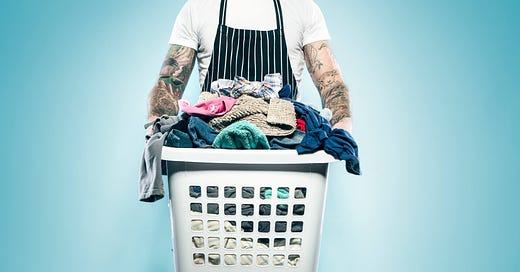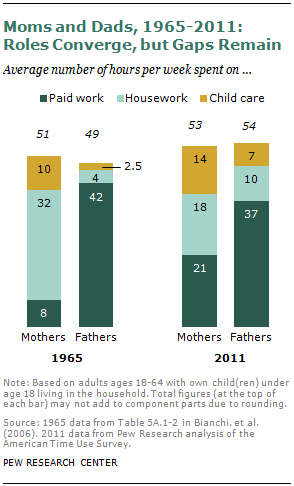Why Are Fathers Suddenly Doing More Housework?
What Mike Pence and Pete Buttigieg Can Teach Us About the Chore Wars
Thanks for reading The Nonlinear Life, a newsletter about navigating life's ups and downs. We explore family, health, work, and meaning, with the occasional dad joke and dose of inspiration. If you're new around here, learn about me, or check out our introductory post. And if you enjoyed this article, please subscribe or share with a friend.
___
It’s a rare week when fatherhood rises to national prominence.
Last Saturday night, Former Vice President Mike Pence attempted to make a joke about Secretary of Transportation Pete Buttigieg taking paternal leave when his twins were in intensive care.
“When Pete’s two children were born, he took two months maternity leave, where upon thousands of travelers were stranded in airports, the air traffic system shut down, airplanes nearly collided in midair,” Pence said. “I mean, Pete Buttigieg is the only person in human history to have a child and all the rest of us get postpartum depression.”
Chasten Buttigieg snapped back on Instagram with a photo of the secretary sitting bedside their children: “An honest question for you, @mikepence, after your attempted joke this weekend. If your grandchild was born prematurely and placed on a ventilator at two months old - their tiny fingers wrapped around yours as the monitors beep in the background - where would you be?” The White House went further, accusing the former vice president of homophobia and demanding an apology.


But while this dispute was grabbing headlines, a new report came out that should have garnered even more attention. The role of dads at home is changing—fast.
Let’s take a step back and review how we got here.
In mathematics, an asymptote describes two functions that get closer and closer to each other without ever actually touching. In life, a similar relationship has existed for decades between the amount of work that dads do around the house and the amount of work that moms do. The line for dads keeps getting closer and closer to the line for moms, but the two never actually meet.
Until the pandemic, that is.
For the last 50 years, the wage gap between men and women is not the only gap that has stubbornly resisted change. The housework gap has also persisted.
A decade ago, Pew did one of its periodic studies of modern parenthood. The study found that more than half of all working parents found it difficult to balance the needs of their job and their needs of their family. But that finding masked an even deeper development: Both men and women were in the midst of generational change.
Women were spending far more time at work—21 hours a week, up from 8 in 1965—while men were spending far more time doing housework and childcare—17 hours, up from 6.5 in 1965. To be sure, a gap still persisted—those 17 hours that men were spending on domestic responsibilities compared with 32 hours for women—but that gap had halved in the preceding 50 years.
My children were in elementary school at that time that survey came out, and one thing I always remembered about that study is that it showed that fathers were twice as likely to feel conflicted about how much time they spent with their kids—46% wanted to spend more time, compared with 23% of mothers. See, dads are taking dadding more seriously!
In the intervening decade, countless surveys have shown how fathers are becoming more engaged at home. But while the gap between mothers and fathers has continued to shrink, it’s never entirely disappeared.
For the first time on record, however, the delta suddenly shrank to almost nothing in the early months of the COVID-19 pandemic in 2020. In a study released last month in the Journal of Family Studies, Richard Petts of Ball State University and eight colleagues showed that during the lockdown, men suddenly began taking on greater responsibilities at home.
In May 2020, close to half of fathers said they took on the bulk of home schooling. And those numbers weren’t just reflected among American dads, but in all countries surveyed, from the Netherlands to Canada. In the United States, for example, the proportion of so-called traditional families where mothers did most of the housework decreased from 69% pre-pandemic to 53% during the pandemic, the highest of all the countries polled.
The researchers summarized this change by saying, “Our study showed that in all countries, fathers increased their share of housework and childcare during the early days of the pandemic, thus moving toward egalitarianism.”
What happened next, though, may be even more important.
As the pandemic waned, those numbers largely reverted to the norm. But in a follow-up analysis released this month based on an ongoing survey of 4,550 opposite-sex parents, Richard Petts and Daniel Carlson, two of the original researchers, found that not all men went back to playing a subordinate role at home. A meaningful percentage—one quarter—shifted from mothers doing most of the housework pre-pandemic to being more likely to have a nontraditional division of housework.
As Richard Weissbourd, the director of Harvard’s Making Caring Common project, told the New York Times, for many dads, spending more time with their children during the pandemic was a “profound experience. It was really getting what a wonderful relationship with your kids could be like, and it was gratifying.”
[For much more on the changing landscape of work, check out my new book, THE SEARCH: Finding Meaningful Work in a Post-Career World.]
So what specifically changed during the last few years—and how can society keep those changes going?
The researchers singled out a handful of findings:
1) Remote work promoted gender equality in divisions of labor by giving both working parents more time at home and a clearer view of the benefits of sharing responsibilities;
2) Job flexibility, in which workers could time-shift obligations to different times of day in partnership with their co-parents, increased dad involvement;
3) The pandemic provided a proof text for not always doing things the old-fashioned way.
The researchers championed a series of actions that could continue this progress—some by governments (parental leave, affordable childcare); others by companies (mentorship programs, flex time).
But to me, what comes through all the more powerfully in these studies is something the rest of us can do to advance these changes more immediately: reducing the social penalty on men that prevents them from owning up to their commitment to their families.
Petts and Carlson write of a “flexibility stigma” that disincentivizes fathers from taking advantage of changing mores. The Pence joke is example of that sigma in action. His message: If fathers prioritize their sick children, they are harming the rest of us.
The best way to counter that stigma is for political leaders, corporate leaders, and everyday citizens to normalize and celebrate fatherhood, which in turn will make men more comfortable seeing themselves—and portraying themselves—as taking on a larger role in the home.
In a week that will see office after office devote supposedly precious productivity time to betting on the Final Four, maybe we can find a way to develop a bracketology around what really keeps a household humming—from bath time to laundry day, from booking the plane tickets to see grandma this summer to reading Goodnight Moon for the 64th time.
Maybe Warren Buffet can even offer a billion dollars to the dad who completes the perfect bracket of household chores. Then we would really test the limits of the chore wars asymptote.
☀
Thank you for reading The Nonlinear Life. Please help us grow the community by subscribing, sharing, and commenting below. If you'd like to do a storytelling project with a loved one similar to the one I did with my father, click here to learn more.
You might enjoy reading these posts:
The One Thing You Need to Be Happy at Work
What ChatGPT (and Ted Lasso) Can Teach Us About Raising Children
3 Benefits of Intergenerational Friendships
Or check out my books that inspired this newsletter: Life Is in the Transitions and The Secrets of Happy Families. Or my new book, The Search: Finding Meaningful Work in a Post-Career World.
Or, you can contact me directly.








